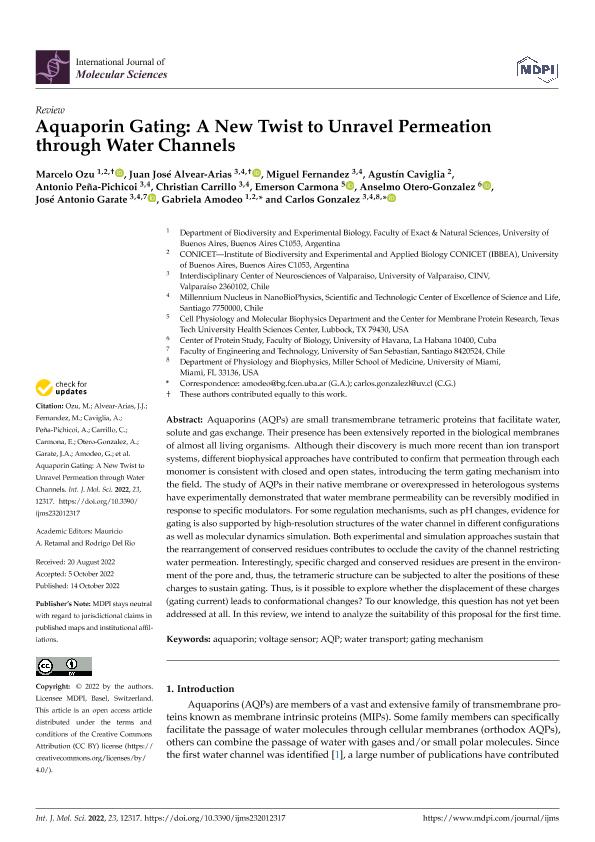Artículo
Aquaporin Gating: A New Twist to Unravel Permeation through Water Channels
Ozu, Marcelo ; Alvear Arias, Juan José
; Alvear Arias, Juan José ; Fernandez, Miguel; Caviglia, Agustín; Peña Pichicoi, Antonio; Carrillo, Christian; Carmona, Emerson; Otero Gonzalez, Anselmo; Garate, José Antonio; Amodeo, Gabriela
; Fernandez, Miguel; Caviglia, Agustín; Peña Pichicoi, Antonio; Carrillo, Christian; Carmona, Emerson; Otero Gonzalez, Anselmo; Garate, José Antonio; Amodeo, Gabriela ; Gonzalez, Carlos
; Gonzalez, Carlos
 ; Alvear Arias, Juan José
; Alvear Arias, Juan José ; Fernandez, Miguel; Caviglia, Agustín; Peña Pichicoi, Antonio; Carrillo, Christian; Carmona, Emerson; Otero Gonzalez, Anselmo; Garate, José Antonio; Amodeo, Gabriela
; Fernandez, Miguel; Caviglia, Agustín; Peña Pichicoi, Antonio; Carrillo, Christian; Carmona, Emerson; Otero Gonzalez, Anselmo; Garate, José Antonio; Amodeo, Gabriela ; Gonzalez, Carlos
; Gonzalez, Carlos
Fecha de publicación:
10/2022
Editorial:
Molecular Diversity Preservation International
Revista:
International Journal of Molecular Sciences
ISSN:
1422-0067
Idioma:
Inglés
Tipo de recurso:
Artículo publicado
Clasificación temática:
Resumen
Aquaporins (AQPs) are small transmembrane tetrameric proteins that facilitate water, solute and gas exchange. Their presence has been extensively reported in the biological membranes of almost all living organisms. Although their discovery is much more recent than ion transport systems, different biophysical approaches have contributed to confirm that permeation through each monomer is consistent with closed and open states, introducing the term gating mechanism into the field. The study of AQPs in their native membrane or overexpressed in heterologous systems have experimentally demonstrated that water membrane permeability can be reversibly modified in response to specific modulators. For some regulation mechanisms, such as pH changes, evidence for gating is also supported by high-resolution structures of the water channel in different configurations as well as molecular dynamics simulation. Both experimental and simulation approaches sustain that the rearrangement of conserved residues contributes to occlude the cavity of the channel restricting water permeation. Interestingly, specific charged and conserved residues are present in the environment of the pore and, thus, the tetrameric structure can be subjected to alter the positions of these charges to sustain gating. Thus, is it possible to explore whether the displacement of these charges (gating current) leads to conformational changes? To our knowledge, this question has not yet been addressed at all. In this review, we intend to analyze the suitability of this proposal for the first time.
Palabras clave:
AQP
,
AQUAPORIN
,
GATING MECHANISM
,
VOLTAGE SENSOR
,
WATER TRANSPORT
Archivos asociados
Licencia
Identificadores
Colecciones
Articulos(IBBEA)
Articulos de INSTITUTO DE BIODIVERSIDAD Y BIOLOGIA EXPERIMENTAL Y APLICADA
Articulos de INSTITUTO DE BIODIVERSIDAD Y BIOLOGIA EXPERIMENTAL Y APLICADA
Citación
Ozu, Marcelo; Alvear Arias, Juan José; Fernandez, Miguel; Caviglia, Agustín; Peña Pichicoi, Antonio; et al.; Aquaporin Gating: A New Twist to Unravel Permeation through Water Channels; Molecular Diversity Preservation International; International Journal of Molecular Sciences; 23; 20; 10-2022; 1-29
Compartir
Altmétricas



